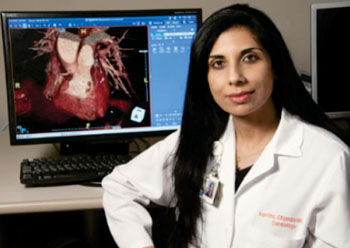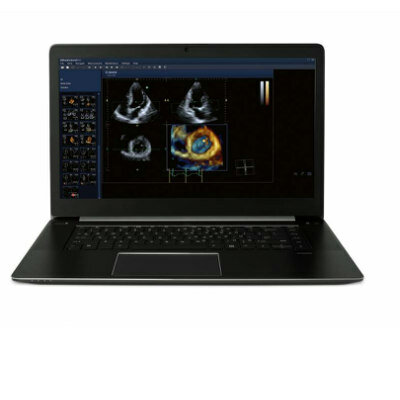Newer Generation, Dual-Source CT Scanners Cut Radiation Exposure to Patients
|
By MedImaging International staff writers Posted on 03 Jul 2014 |

Image: “Newer technology makes a difference in terms of radiation exposure and the difference is quite large,” says study author Kavitha Chinnaiyan, MD, director of Advanced Cardiac Imaging Research at Beaumont Hospital, Royal Oak (Photo courtesy of Beaumont Health System).
Computed tomography (CT) scans are a recognized standard of care for identifying heart and lung disorders. However, clinicians have concerns that the growing use of CT scans could be putting patients at a higher lifetime risk of cancer from radiation exposure. New research has revealed that the use of the latest advances in CT scanning technology is helping to tackle this important concern.
The new findings, published in the June 20, 2014, online issue of the Journal of Cardiovascular Computed Tomography, consisted of 2,085 patients at nine centers in the United States and the Middle East, and revealed that using newer generation, dual-source CT scanners substantially reduced radiation exposure for patients when compared with first generation, 64-slice, single-source scanners or first generation, dual-source CT scanners.
Patient radiation exposure was reduced by 61% with the newer scanners, with no significant difference in image quality for patients having CT scans for coronary artery disease, pulmonary embolism or aortic disease. “Newer technology makes a difference in terms of radiation exposure and the difference is quite large,” stated study author Kavitha Chinnaiyan, MD, director of advanced cardiac imaging research at Beaumont Hospital, Royal Oak (MI, USA). “It is important for patients to ask questions when referred for a radiation-based test to understand what the procedure involves and what the risks are of the particular technique and if there are alternative imaging choices.”
In addition, the study has significant implications for referring physicians. “Clinicians must understand that imaging studies not only have a major impact on the care of an individual patient, but also on trends in radiation exposure, as well as overall healthcare costs,” noted Dr. Chinnaiyan. “Incidental findings may require further imaging studies with other radiation-based tests. In addition to choosing patients appropriately, it is important to discuss the risks and benefits of testing with patients, and to refer them to centers that offer newer technologies.”
The findings, according to the researchers, provide vital information that will help in setting standards for radiation safety quality control in cardiovascular imaging.
Related Links:
Beaumont Hospital, Royal Oak
The new findings, published in the June 20, 2014, online issue of the Journal of Cardiovascular Computed Tomography, consisted of 2,085 patients at nine centers in the United States and the Middle East, and revealed that using newer generation, dual-source CT scanners substantially reduced radiation exposure for patients when compared with first generation, 64-slice, single-source scanners or first generation, dual-source CT scanners.
Patient radiation exposure was reduced by 61% with the newer scanners, with no significant difference in image quality for patients having CT scans for coronary artery disease, pulmonary embolism or aortic disease. “Newer technology makes a difference in terms of radiation exposure and the difference is quite large,” stated study author Kavitha Chinnaiyan, MD, director of advanced cardiac imaging research at Beaumont Hospital, Royal Oak (MI, USA). “It is important for patients to ask questions when referred for a radiation-based test to understand what the procedure involves and what the risks are of the particular technique and if there are alternative imaging choices.”
In addition, the study has significant implications for referring physicians. “Clinicians must understand that imaging studies not only have a major impact on the care of an individual patient, but also on trends in radiation exposure, as well as overall healthcare costs,” noted Dr. Chinnaiyan. “Incidental findings may require further imaging studies with other radiation-based tests. In addition to choosing patients appropriately, it is important to discuss the risks and benefits of testing with patients, and to refer them to centers that offer newer technologies.”
The findings, according to the researchers, provide vital information that will help in setting standards for radiation safety quality control in cardiovascular imaging.
Related Links:
Beaumont Hospital, Royal Oak
Latest Radiography News
- Novel Breast Imaging System Proves As Effective As Mammography
- AI Assistance Improves Breast-Cancer Screening by Reducing False Positives
- AI Could Boost Clinical Adoption of Chest DDR
- 3D Mammography Almost Halves Breast Cancer Incidence between Two Screening Tests
- AI Model Predicts 5-Year Breast Cancer Risk from Mammograms
- Deep Learning Framework Detects Fractures in X-Ray Images With 99% Accuracy
- Direct AI-Based Medical X-Ray Imaging System a Paradigm-Shift from Conventional DR and CT
- Chest X-Ray AI Solution Automatically Identifies, Categorizes and Highlights Suspicious Areas
- AI Diagnoses Wrist Fractures As Well As Radiologists
- Annual Mammography Beginning At 40 Cuts Breast Cancer Mortality By 42%
- 3D Human GPS Powered By Light Paves Way for Radiation-Free Minimally-Invasive Surgery
- Novel AI Technology to Revolutionize Cancer Detection in Dense Breasts
- AI Solution Provides Radiologists with 'Second Pair' Of Eyes to Detect Breast Cancers
- AI Helps General Radiologists Achieve Specialist-Level Performance in Interpreting Mammograms
- Novel Imaging Technique Could Transform Breast Cancer Detection
- Computer Program Combines AI and Heat-Imaging Technology for Early Breast Cancer Detection
Channels
MRI
view channel
Low-Cost Whole-Body MRI Device Combined with AI Generates High-Quality Results
Magnetic Resonance Imaging (MRI) has significantly transformed healthcare, providing a noninvasive, radiation-free method for detailed imaging. It is especially promising for the future of medical diagnosis... Read more
World's First Whole-Body Ultra-High Field MRI Officially Comes To Market
The world's first whole-body ultra-high field (UHF) MRI has officially come to market, marking a remarkable advancement in diagnostic radiology. United Imaging (Shanghai, China) has secured clearance from the U.... Read moreUltrasound
view channel.jpg)
Diagnostic System Automatically Analyzes TTE Images to Identify Congenital Heart Disease
Congenital heart disease (CHD) is one of the most prevalent congenital anomalies worldwide, presenting substantial health and financial challenges for affected patients. Early detection and treatment of... Read more
Super-Resolution Imaging Technique Could Improve Evaluation of Cardiac Conditions
The heart depends on efficient blood circulation to pump blood throughout the body, delivering oxygen to tissues and removing carbon dioxide and waste. Yet, when heart vessels are damaged, it can disrupt... Read more
First AI-Powered POC Ultrasound Diagnostic Solution Helps Prioritize Cases Based On Severity
Ultrasound scans are essential for identifying and diagnosing various medical conditions, but often, patients must wait weeks or months for results due to a shortage of qualified medical professionals... Read moreNuclear Medicine
view channelNew PET Agent Rapidly and Accurately Visualizes Lesions in Clear Cell Renal Cell Carcinoma Patients
Clear cell renal cell cancer (ccRCC) represents 70-80% of renal cell carcinoma cases. While localized disease can be effectively treated with surgery and ablative therapies, one-third of patients either... Read more
New Imaging Technique Monitors Inflammation Disorders without Radiation Exposure
Imaging inflammation using traditional radiological techniques presents significant challenges, including radiation exposure, poor image quality, high costs, and invasive procedures. Now, new contrast... Read more
New SPECT/CT Technique Could Change Imaging Practices and Increase Patient Access
The development of lead-212 (212Pb)-PSMA–based targeted alpha therapy (TAT) is garnering significant interest in treating patients with metastatic castration-resistant prostate cancer. The imaging of 212Pb,... Read moreGeneral/Advanced Imaging
view channelBone Density Test Uses Existing CT Images to Predict Fractures
Osteoporotic fractures are not only devastating and deadly, especially hip fractures, but also impose significant costs. They rank among the top chronic diseases in terms of disability-adjusted life years... Read more
AI Predicts Cardiac Risk and Mortality from Routine Chest CT Scans
Heart disease remains the leading cause of death and is largely preventable, yet many individuals are unaware of their risk until it becomes severe. Early detection through screening can reveal heart issues,... Read moreImaging IT
view channel
New Google Cloud Medical Imaging Suite Makes Imaging Healthcare Data More Accessible
Medical imaging is a critical tool used to diagnose patients, and there are billions of medical images scanned globally each year. Imaging data accounts for about 90% of all healthcare data1 and, until... Read more
Global AI in Medical Diagnostics Market to Be Driven by Demand for Image Recognition in Radiology
The global artificial intelligence (AI) in medical diagnostics market is expanding with early disease detection being one of its key applications and image recognition becoming a compelling consumer proposition... Read moreIndustry News
view channel
Hologic Acquires UK-Based Breast Surgical Guidance Company Endomagnetics Ltd.
Hologic, Inc. (Marlborough, MA, USA) has entered into a definitive agreement to acquire Endomagnetics Ltd. (Cambridge, UK), a privately held developer of breast cancer surgery technologies, for approximately... Read more
Bayer and Google Partner on New AI Product for Radiologists
Medical imaging data comprises around 90% of all healthcare data, and it is a highly complex and rich clinical data modality and serves as a vital tool for diagnosing patients. Each year, billions of medical... Read more



















